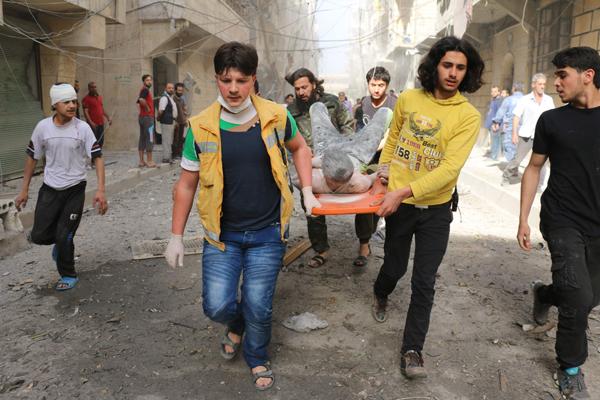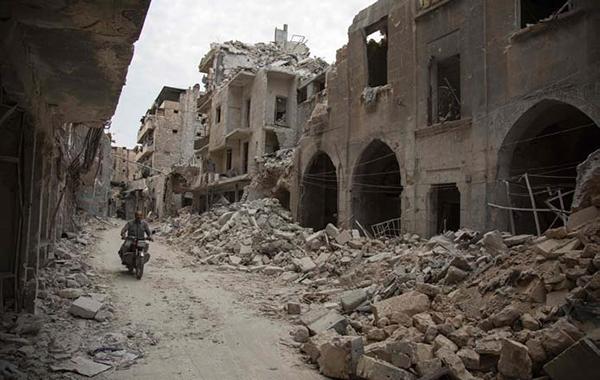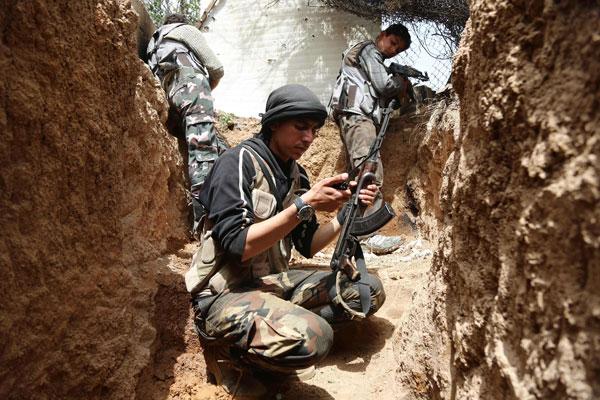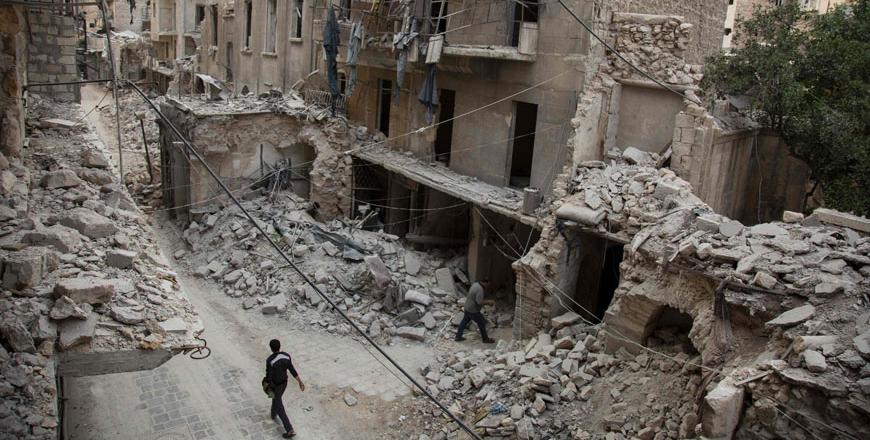You are here
Military build-up, fighting spells end of Syrian ceasefire
By AP - Apr 27,2016 - Last updated at Apr 27,2016

Syrians carry a wounded youth following an air strike on the Fardous rebel-held neighbourhood of the northern Syrian city of Aleppo on Tuesday (AFP photo)
BEIRUT — A military build-up in northern Syria, coupled with heavy fighting and mounting civilian casualties, spells the end of a ceasefire that for two months brought some relief to a war-weary country. The renewed violence is ushering in what could be an even more ruinous chapter in the five-year-old conflict.
About 200 civilians have been killed in the past week, nearly half of them around Aleppo. There has even been shelling in Damascus, along with a car bomb — both rarities for the capital.
With peace talks in Geneva completely deadlocked, Syrians are regarding the escalating bloodshed with dread, fearing a return to full war and slow destruction.
"There are regime attempts to advance and preparations by [rebel]forces to advance in the other direction. But the truth is that both sides have no capacity to advance," said activist Ahmad Al Ahmad, who lives in opposition-held areas outside Hama. "It is attrition, except for the planes, which can target civilians."
Aleppo is likely to be the focus of the next phase of the war, with both sides preparing for a major battle, according to senior rebel leaders and opposition activists who spokes to The Associated Press.
Government forces have been mobilising soldiers, equipment and ammunition in preparation for a military action in Aleppo, said Maj. Jamil Saleh, leader of Tajammu Alezzah, a Free Syrian Army faction that has received US-delivered TOW anti-tank missiles.
He said his group, which operates primarily in Hama and Latakia, has sent troops to Aleppo to help the rebels ward off government advances. He described the air strikes and artillery shelling in the former commercial capital for the last week as "preparatory" work for a major campaign.
Opposition activists also said a substantial redeployment of personnel has taken place recently, as contingents of the Syrian army and allied militias have moved from Palmyra to the vicinity of Aleppo.
"The ceasefire was a cover, because the regime never committed to it since the start of the ceasefire," Saleh said in a telephone interview from Syria.
Nazeer Al Khatib, an activist who lives on the outskirts of Aleppo, said the city is being choked off by fighting. Government and allied forces are moving in on the main highway to rebel-held areas, blocking the only access to the rest of the country, he said.
Aleppo residents already are moving out of Syria's largest city to rural areas to evade violence, but also out of fear of getting trapped amid shortages of food and rising prices.
The city was the focus of government efforts that succeeded in almost completely choking off rebels holed up in some neighbourhoods before the US and Russia engineered the ceasefire on February 27.
The truce held surprisingly well for weeks, underlining the exhaustion on all sides. Formally called a "cessation of hostilities", it was never meant to be complete because it excluded extremists such as the Daesh terror group and its rival Al Qaeda branch, Al Nusra Front. The presence of Al Nusra in almost every contested area has allowed the Syrian army and its Russian allies to target opposition-held areas while also claiming not to have technically violated the ceasefire.
That has allowed the truce to gradually unravel, with both sides accusing each other of incremental violations, mainly in the crucial Aleppo area where all sides are trying to expand their presence.
Any move to cut off Aleppo completely and end resistance in the city is likely to be a costly and extended affair, resulting in mass casualties and more refugees fleeing the country. There is talk that Saudi Arabia and Turkey, key backers of the rebels, may renew weapons shipments as the peace talks flounder.
Firas Abi Ali, principal analyst at IHS Country Risk, said an offensive on Aleppo also risks a reunification of the Syrian opposition around groups such as Al Nusra. He said it also increases the likelihood of cooperation between Al Nusra and Daesh to capture towns south of Aleppo that are crucial to supplying government forces.
The ground movements suggest that forces loyal to President Bashar Assad, which have been on the ascendancy thanks to unwavering Russian and Iranian support, are likely to try to win back Aleppo.
"The fighting is about to get worse," said Hilal Khashan, political science professor at the American University of Beirut. "I think we will see an escalation before serious [peace] talks begin."
Russia's six-month air campaign allowed Assad's forces to advance in key areas against the rebels, and the recapture of Palmyra from Daesh militants has won his forces praise, including from the head of the United Nations.
With Washington caught up in a presidential election, the US is inclined to pay even less attention to Syria, and its focus is squarely on the war with Daesh. This week, President Barack Obama said an additional 250 military personnel would be deployed to Syria to train and advise local units to eventually dislodge Daesh from its de facto capital of Raqqa.
The opposition backed out of the Geneva talks last week, saying the government had repeatedly violated the ceasefire. UN envoy Staffan de Mistura met with the Syrian government delegation Tuesday, and the latest round of talks was due to conclude Wednesday.
Related Articles
ALEPPO — Under pressure from Russia and the United States, the Syrian army agreed on Wednesday to respect a two-day truce in the war-ravaged
BEIRUT/MOSCOW — The Russian air force and Syrian military are preparing a joint operation to take Aleppo from rebels, the Syrian prime minis
BEIRUT/MOSCOW — Rebel fighters launched an assault in Syria's divided northern city of Aleppo on Tuesday and fired rockets on a hospital, in














